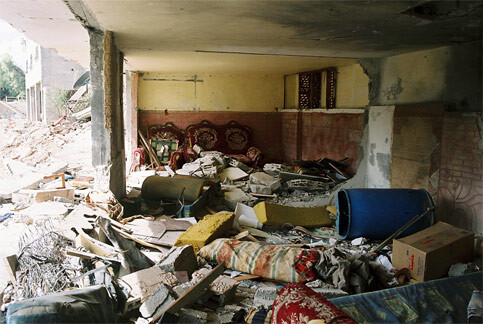The Electronic Intifada 26 September 2007

A Palestinian apartment blown up during an Israeli military incursion. (Shabtai Gold/IRIN)
EIN BEIT ALMA, 26 September (IRIN) - Residents of the Ein Beit Alma refugee camp began to pick up the pieces after an intense Israeli military incursion last week left dozens homeless, and many very frightened, especially children. The fighting with Palestinian militants also caused damage to sewer systems, residents said.
Muhammed Msaimi, aged 26, hid for over a day with his wife and three children in the bathroom because of gunfights which took place outside their apartment. However, the bullets found their way into that room as well, and they crawled behind a thick wall, Msaimi, a registered refugee, said.
“Then the soldiers came and told us to leave. They said we should cover our ears. They blew up the floor above us. No one lives there,” he told IRIN. The explosion knocked out the entire upper floor and caused structural damage to the rest of the building. Msaimi now lives with his in-laws.
The Israeli military said the purpose of the three-day operation was to “prevent the execution of terror attacks into the Israeli home front,” and that information obtained from arrested alleged militants, 49 in all, had led them to an explosive belt which had been smuggled into Tel Aviv.
Fear
However, the effect on the civilian population was considerable, residents said.
“My children are afraid to come back here,” said Msaimi, adding that they were staying at a friend’s home nearby.
“The effects of these military operations at such close quarters have an incalculable impact on the well-being of the young,” said Christopher Gunness from UNRWA, the UN agency for Palestinian refugees.
The agency runs psycho-social programs and has counsellors at its two camp schools.
“The children are not studying now; they are frightened. They go to school and draw, color and read stories,” said Samia Abu Salah, whose children attend UNRWA schools and are taking part in a program which tries to help the children express their feelings.
Her home was invaded by the military: “We heard noises from below our bedroom. It was the Jews underneath,” she recounted, referring to the Israeli soldiers. “We all moved away, into the stairwell. Then we saw them coming out of the floor, from below,” Abu Salah said. The soldiers had blown up the apartment below, knocking a hole in the ceiling and were climbing upwards.
Gunness said UNRWA can offer limited financial support for those who lost their homes or suffered damage.
“Through walls” tactic
According to the residents in other homes a similar tactic, known as “through walls,” was used. Soldiers go through neighbors’ homes, destroying joint walls, to reach targets without being exposed in the narrow streets.
The building next to Abu Salah, four stories high, was totally demolished by Israeli bulldozers, leaving dozens homeless. Personal belongings like furniture, video tapes and clothes stick out of the rubble. The soldiers, searching for and fighting militants, did not give the residents time to get their possessions out, residents said.
Several people said the soldiers used three locals as human shields, a practice deemed illegal by Israel’s High Court. The Israeli military said it was “not aware of any such incident.”
In other areas, people were cordoned off while soldiers used their homes as observation points, residents said.
“My brother had 71 people in his house — the women in one room and the men in another — for two days,” said Ghassan, a school teacher. “They used all their food in one day but received bread from the Palestinian Medical Relief on the second.”
“The noises during the fighting hurt my ears so much,” said Aisha, aged 74, as she sat on the floor preparing soup from UNRWA food aid.
Sewage pipes damaged during the fighting overflow outside her small home, spreading a foul smell in the air.
“The windows are broken. I hope they fix it before winter. It’s getting cold now at night,” she said.
This item comes to you via IRIN, a UN humanitarian news and information service, but may not necessarily reflect the views of the United Nations or its agencies. All IRIN material may be reposted or reprinted free-of-charge; refer to the copyright page for conditions of use. IRIN is a project of the UN Office for the Coordination of Humanitarian Affairs.


